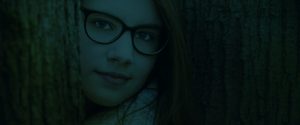Have you noticed more children are wearing eyeglasses?
We’ve all seen the stereotype of the studious, ‘nerdy’ kid wearing a thick pair of glasses. But are more children now wearing glasses and has reading raised the risk that a child will become myopic (nearsighted)?
Researchers have been trying to figure that out.
A study published in Ophthalmology (2014), was conducted on 4,658 people aged between 35 and 74 years, over 50% of all university graduates were myopic, compared with 34% of non-graduates.
What is myopia?
Myopia (short-sighted) is corrected with glasses or contact lenses, and while glasses are becoming more fashionable, short-sightedness is still undesirable as it can cause the development of eye conditions that can lead to vision loss later in life.
So, aside from preventing your child from going to university (because let’s be honest, we don’t want to discourage that), what can you do to lessen the chances of your child becoming myopic?
If you’re concerned about your child’s myopia, contact an eye doctor near you.
SEE RELATED: The Benefits of Outdoor Play for Children with Myopia
The solution
Myopia is caused by the eyeball becoming slightly longer than normal. When light is directed in front of the retina rather than directly on it, distant objects appear blurry. Nearsighted children frequently complain of headaches, and squint, blink and hold books close to their eyes.
Nearsightedness can also be caused by visual stress, which explains the link between educational level and “near work” (reading and writing), as found by researchers.
Over the past 10 years, studies have consistently shown one thing that might help – having your child spend more time outside.
Experimental Eye Research (2013), an Australian review found that children who spent time outdoors had a clearly reduced risk of nearsightedness.
Being outdoors reduces the influence of lots of near work.
Ultraviolet light may cause the pupils in the eyes to constrict, increasing the depth of focus and reducing blurring, or it may boost dopamine release, resulting in less eyeball lengthening. What a child actually does outdoors doesn’t seem to matter – a leisurely walk can be just as therapeutic as a football game.
The amount of time spent outdoors is also unknown, while a study from the University of Cambridge revealed that spending an extra hour a week outside was linked to a 2% lower risk of developing short-sightedness.
According to these findings, children with myopia spend 3.7 less hours each week outside than those who are not.
What can you do?
As a parent you want what’s best for your child. To prevent myopia and/or the progression of myopia do the following:
- Encourage outdoor time. Every day, children of all ages should spend at least 90 minutes outside. While this may appear difficult to attain in our hectic lives, it is most likely to be accomplished at school for primary-school-aged children. If you’re unsure, ask your child’s teacher about their recess activities. Plan a family adventure over the weekend – even a walk to the local park and a quick game will pass the time.
- Keep them active. School-aged children should engage in moderate to intense physical activity for at least 60 minutes every day. The more time they spend outside, the better for their visual development. Again, for primary school-aged children, this can be accomplished primarily during recess.
- Protect their eyes. When outside make sure your child wears a hat and UV protection sunglasses. Your child will reap the benefits of good eye health.
- Regular eye exams. Your eye doctor can detect any vision problems early, before they start to impact your child’s school or sports performance.
Many eye doctors also provide a program of myopia management, which can lower the risks of your child developing serious eye diseases later in life.
LEARN MORE: Guide to Pediatric Eye Conditions
Schedule an eye exam with an eye doctor near you, to discuss how to keep your child’s myopia under control.
More children than ever are now wearing glasses and reading seems to be a cause. There are a range of successful options now available at most eye doctors.








